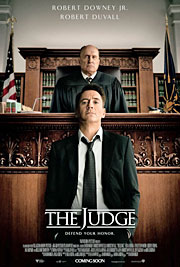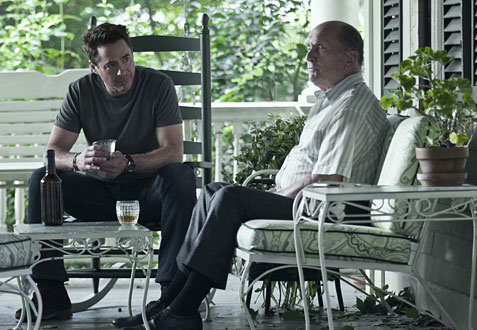
The person who edited the trailers for “The Judge” should get an award. They made this movie look fantastic, an edge-of-your-seat legal thriller with an estranged father and son at the center. Then we see the director’s cut, as it were, and discover what it really is: one the flimsiest courtroom cases ever filmed, and the father/son story is a smoke screen for a much, much worse plot line: the yuppie who finds his soul. This was a popular theme in the early ‘90s (“Regarding Henry,” “The Doctor”). I will drive to California and burn Hollywood to the ground if they try to make this a thing again.
Hank Palmer (Robert Downey Jr.) is a stereotypical soulless big city defense attorney who discovers that his mother has passed away. Staring down a divorce (due, naturally, to his workaholism), Hank takes a solo trip to his hometown of Carlinville, Indiana to pay his respects and play friendly with his estranged family. Hank and his father Joseph (Robert Duvall), the town judge, haven’t spoken in years, and not even Hank’s mom’s death can soften things. Hank plans to leave the day after the funeral, but as he’s packing up, he discovers that his father’s car is damaged, showing signs that he was in an accident the night before. It turns out that Joseph struck and killed someone with his car, and knowing that his father needs a rock solid defense, Hank stays behind to give him one. Hank’s biggest obstacle to properly defending his father, is, of course, his father.
The big city where Hank practices law is Chicago, yet he takes a plane, and then what appears to be a lengthy car drive, to the fictional city of Carlinville, Indiana. Wouldn’t it be more convenient, from a time and expense standpoint, to just drive the whole way? It would, but all of the airport scenes seem to exist for three reasons: it gives Hank’s older brother Glen (Vincent D’Onofrio) the opportunity to tell Hank to shut up and listen for once in his life, and that is obviously something we need to hear someone say to him; it allows Hank’s daughter Lauren (Emma Tremblay) the opportunity to pop in and set up the next part of the ‘B’ story; most importantly, it creates a ‘Sliding Doors’ moment (“If you don’t get off this plane right now,” etc.), one that would be far less impactful if, say, he’s only 20 miles out of town in a car, and can easily turn around. It is the screenwriting equivalent of the tail wagging the dog, which is to say, it’s lazy.
And yet, that is nowhere near as lazy as the courtroom proceedings. There just isn’t enough meat on these bones, and the verdict seems like both a foregone conclusion and a failure by one of the lawyers to exploit an obvious loophole. The movie was directed by David Dobkin, who made his bones with films like “Wedding Crashers” and “The Change-Up,”), so good for him for trying to branch out and do something different, but he was hosed from the get-go. He’s directing a script that includes a scene where Downey and Duvall finally address the simmering tension between the two during, yep, a tornado warning. The figurative storm that takes place during the literal storm: that is as heavy-handed as it gets. This is not to say that Dobkin gets out of jail free, because there were several questionable directorial decisions made on his part, but he’s not the reason the movie is bad. He doesn’t help, but he’s not the cause.
It’s fortunate, then, that the movie was loaded with talent to make this movie better than it has a right to be. Downey makes Hank as likable as possible, despite the fact that even the people who love him think he’s a tool, and that’s huge; if the audience doesn’t like Hank, then nothing else in the movie really matters, so casting his part was crucial. Getting Vera Farmiga to play the proverbial one that got away (by staying) was a masterstroke. Duvall handles his role with aplomb, though he is curiously the most underwritten character in the movie. Props also go to Leighton Meester, who charms in a small role as a local bartender.
The polite thing to say about a movie like “The Judge” is that it’s redeemable if they had only done this or that differently. I’m not sure if this movie could have been saved. Everything about it is aggressively mediocre, aside from some of the acting, and the actors were likely drawn to it because it was familiar, and had the potential to be Oscar bait. The trailer of this movie is the best version of it that will ever exist. Stick with that.
Related Posts
Comments Off on Movie Review: “The Judge”
Posted in: Entertainment, Movie Reviews, Movies
Tags: Robert Downey Jr., Robert Duvall, The Judge, The Judge review
















